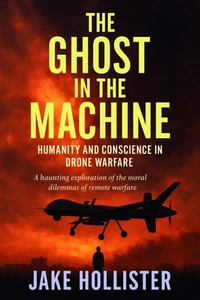Drone warfare has redefined the modern battlefield, placing soldiers behind screens and joysticks while their decisions determine life and death in real-world conflicts. Joystick Soldiers: Cognitive Strain and Responsibility in Drone Operations explores the psychological, ethical, and technological dimensions of remote combat, revealing how operators cope with cognitive strain, moral ambiguity, and the unique pressures of decision-making from thousands of miles away.
From the evolution of unmanned aerial vehicles (UAVs) to the rise of autonomous weapons, this book examines how military technology reshapes warfare strategy, human-machine interaction, and the operator's psyche. Readers will gain an inside look at the gamification of killing, the ethical dilemmas of civilian casualties, and the hidden mental health consequences such as post-traumatic stress, emotional dissonance, and compassion fatigue.
The book also analyzes the legal and ethical responsibilities in cross-border drone strikes, the challenges of accountability, and the moral burden carried by soldiers who operate remotely. Through compelling case studies, interviews with operators, and insights from psychologists and ethicists, Joystick Soldiers uncovers the human cost of remote combat. It explores the paradox of technological efficiency versus emotional detachment, showing how reliance on automation can blur moral boundaries while creating cognitive overload and stress.
Readers will understand the strategies militaries use to train operators, including simulation-based exercises, virtual reality programs, and resilience-building techniques, alongside their limits and unintended consequences. This book also addresses the broader societal impact of drone warfare, including media representations, public perception, and the civilian-military divide. It challenges readers to reflect on the ethical implications of modern military technology and asks critical questions about the future of autonomous weapons, AI-driven combat systems, and unseen wars fought digitally across the globe.
Drone warfare has redefined the modern battlefield, placing soldiers behind screens and joysticks while their decisions determine life and death in real-world conflicts. Joystick Soldiers: Cognitive Strain and Responsibility in Drone Operations explores the psychological, ethical, and technological dimensions of remote combat, revealing how operators cope with cognitive strain, moral ambiguity, and the unique pressures of decision-making from thousands of miles away.
From the evolution of unmanned aerial vehicles (UAVs) to the rise of autonomous weapons, this book examines how military technology reshapes warfare strategy, human-machine interaction, and the operator's psyche. Readers will gain an inside look at the gamification of killing, the ethical dilemmas of civilian casualties, and the hidden mental health consequences such as post-traumatic stress, emotional dissonance, and compassion fatigue.
The book also analyzes the legal and ethical responsibilities in cross-border drone strikes, the challenges of accountability, and the moral burden carried by soldiers who operate remotely. Through compelling case studies, interviews with operators, and insights from psychologists and ethicists, Joystick Soldiers uncovers the human cost of remote combat. It explores the paradox of technological efficiency versus emotional detachment, showing how reliance on automation can blur moral boundaries while creating cognitive overload and stress.
Readers will understand the strategies militaries use to train operators, including simulation-based exercises, virtual reality programs, and resilience-building techniques, alongside their limits and unintended consequences. This book also addresses the broader societal impact of drone warfare, including media representations, public perception, and the civilian-military divide. It challenges readers to reflect on the ethical implications of modern military technology and asks critical questions about the future of autonomous weapons, AI-driven combat systems, and unseen wars fought digitally across the globe.

 , qui est-ce ?
, qui est-ce ?